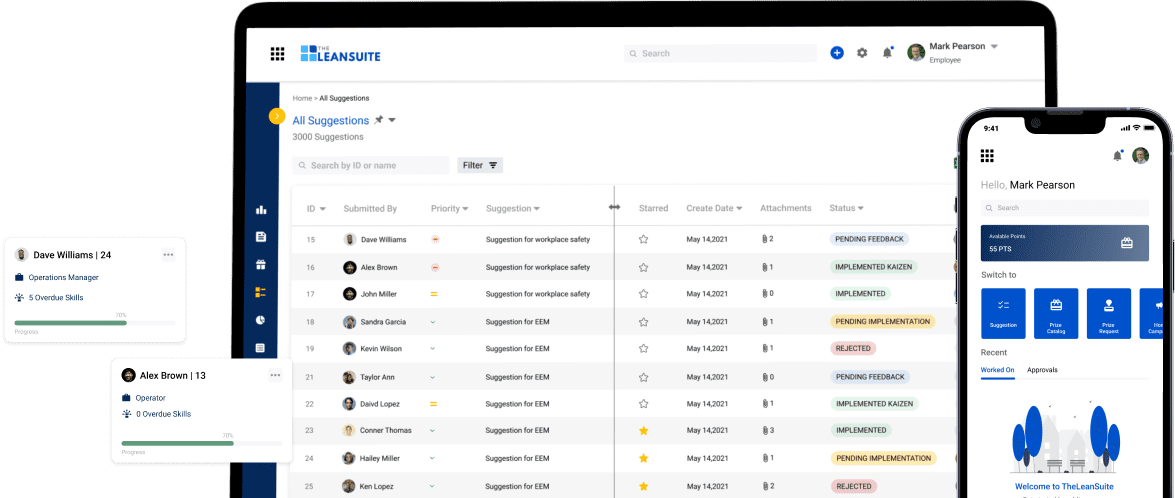Before we get into detailing why you should digitize abnormality reporting (F-tags), let’s first discuss what abnormality reporting (F-tags) are and why they’re essential for any manufacturing business.
What is Abnormality Reporting (F-tags)?
Abnormality reporting is also known as F-tags. The F in F-tag stands for Fuguai, a Japanese word that translates to “deviation” or “abnormality” in English. So, an F-tag is a visual work order system where employees attach paper tags to machines and equipment when a process abnormality or irregularity has been identified. Essentially, F-tags are used to highlight deviations, faults, or abnormalities.
In short, manufacturing businesses utilize F-tags because:
- – It improves efficiency, safety, and OEE
- – It increases employee engagement
- – It helps foster a continuous improvement culture
- – It’s an important part of TPM and preventive maintenance programs
The Three Types of F-tags
There are three types of F-tags: maintenance, operator (non-maintenance), and safety.
1. Maintenance
Maintenance F-tags are red and requires specific personnel such as electricians, mechanics, and technicians to fix abnormalities.
2. Operator
Operator (non-maintenance) F-tags are blue and does not require any maintenance specific personnel to fix abnormalities. So, in other words, operators, supervisors, and cleaners can fix operator specific abnormalities. It is also important to note that examples of areas where operator F-tags should be attached to include:
- – Wear
- – Leakages
- – Dust and dirt
- – Corrosion
- – Cracking, surface damage
- – Overheating
- – Vibration, noise
3. Safety
Safety F-tags are yellow and requires mechanics or operators to fix abnormalities. However, anyone can write and attach a safety F-tag.
3 Reasons Why You Should Digitize Abnormality Reporting
(F-tags)
Traditionally, F-tags are done manually by hand — an individual attaches the relevant F-tag paper to the faulty machine or equipment, then the right personnel fixes it. But, this process is inefficient as:
- – You waste a lot of time and money putting in a lot of administrateive work to manually manage your tagging process
- – It takes a long time to close critical problems, increasing your machine and equipment downtime, costing you more money
- – You’re unable to gain in-depth insight on your tagged issues so that you can improve your operational processes
Therefore, you should digitize abnormality reporting (F-tags) in order to make your tagging process easier to manage and control. Ultimately, there are three reasons why you should digitize abnormality reporting:
1. Automatically capture data in real-time
The first reason why you should digitize abnormality reporting is because it allows you to automatically capture data and analyze reports in real-time. Some problems need to be fixed right away, while others are lower priority. Digitizing abnormality reporting allows you to prioritize problems that may be causing you the most losses. In essence, it enables you to identify and resolve high priority problems quicker.
2. Save time and money
The second reason why you should digitize abnormality reporting is because it saves you and time money. Digitizing abnormality reporting significantly reduces the administrative effort that was traditionally expected. As a result, your employees can focus on resolving problems, instead of data management. Moreover, since your employees are able to focus more on resolving problems, they’ll resolve problems faster, resulting in reduced machine or equipment downtime. Therefore, saving you money.
3. Increase employee engagement
The third and final reason why you should digitize abnormality reporting is because it increases employee engagement. Digitizing abnormality reporting increases efficiency and productivity on your shop-floor and your employees will clearly see these changes from their reporting. This will motivate them to continue working harder to make positive changes to your operational processes. Thus, engaging them.
Digitize Abnormality Reporting (F-tags) with TheLeanSuite
TheLeanSuite is a lean manufacturing software that offers various built-in apps designed to accelerate your continuous improvement program. One of them being the Issue Tracker, a maintenance tagging system that digitizes abnormality reporting (F-tags). That is to say, it digitizes identifying abnormalities, attaching relevant pictures and documents, assigning abnormalities to the correct personnel, and much more.





